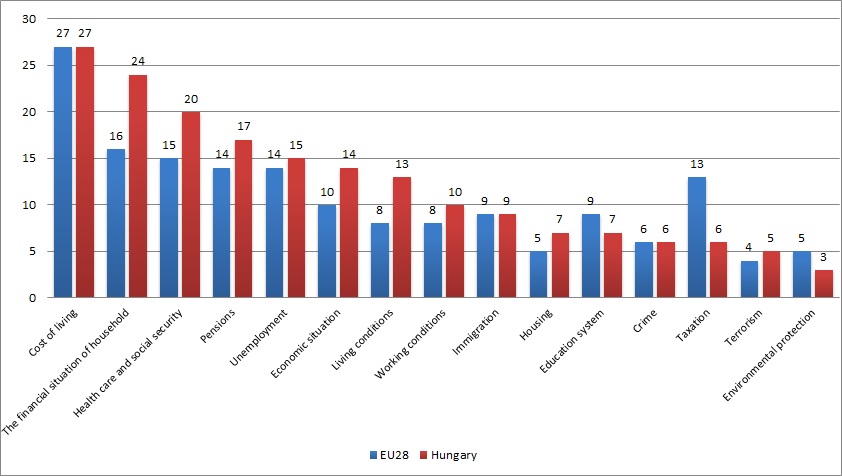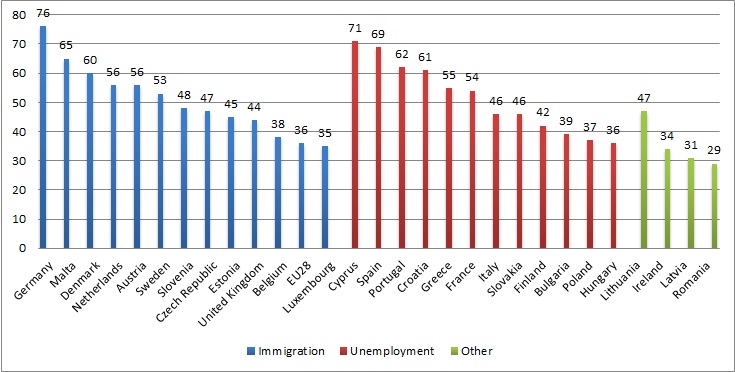Altough the number of refugees has been significantly reducing recently (mainly due to the winter wheather conditions), anti-immigrant campaign of the Hungarian goverment is still in full swing. In the early stage of the campaign (Summer 2015), it focused on economic concerns (“they’re taking our jobs”) and collecting signatures to reject EU quotas. Now, starting with December 2015, the new stage has began: blurring the lines between migrants and terrorists – what clearly affects Hungarian people’s sense of security. It is also a good justification for the planned modification of the Hungarian Fundamental Law in order to give special rights for the goverment in “the state of emergency”.
It’s a question of whether the refugee crisis is used to fulfill the political agenda or does it really disprove the plan of Orbán’s government. The Eurobarometer results from 2015 Autumn show an important contradiction in terms of the attitudes of Hungarians: the Orbán government succeeded in rising anti-immigrant sentiment and fear of terrorism of Hungarians – but only on a European level.
Most of the EU respondents identify migration (58 %) and terrorism (25 %) as the issues of key importance that the EU has to face. According to the survey, Hungarians significantly more frequently talk about European issues than half a year ago. Anti-migrant rhetoric definitely has had its effect on the Hungarian voters – the proportion of people considering migration and terrorism as “problems” rose more visibly than the EU average due to the communication campaign.

What do you think are the two most important issues facing (our country) at the moment? (Source: Eurobarometer Autumn 2015)
Nevertheless, the situation is less obvious on the national level: despite the communication offensive of the past couple of months, the migration didn’t become the main challenge Hungary has to face. Why is that? Simply because the biggest challenge is still posed by the unemployment. Economic issues such as health care, social security, cost of living strongly dominate the top of the scale. And it doesn’t stop with Hungary – 12 EU countries consider unemployment as the most important issue nation-wise. On the other hand, we’ve got also 12 (different) countries where immigration is regarded as the greatest challenge. This phenomenon clearly shows yet another East-West cleavage within the EU.

What are the two most important issues you are personally facing at the moment?
(Source: Eurobarometer Autumn 2015)
Economic issues and problems related to the cost of living unquestionably dominate when it comes to individual problems – in this category migration and terrorism fall back significantly as the most important issues; only 9 and 5 % of the respondents mentioned them1. This leads us to the conclusion that the Hungarian voters attitudes have become more anti-migrant due to the govermental communication campaign, but they interpret it as a European problem, not as Hungary-specific or individual. Economic issues (job creation, enhancing the economic situation, reforms of social security and health care systems) still prevail in Hungary. For an individual, the financial situation of the household is considered the most important issue (1,5 times more frequently than by the EU member states in general).
The conclusion for the Hungarian opposition shall therefore be quite obvious: they need to find an answer to the abovementioned economic needs. The refugee crisis may dominate the public discussion for now, but everyday lives of the voters are defined by the worsening economic situation and the fear of wash-out. Despite the success propaganda and constant denial of any troubles in general, Fidesz clearly doesn’t have the solution for these problems. They may not be easy to defeat (or may not be defeated at all) when it comes to the migrant issue, but they actually don’t need to be: the opposition has to create a vision and a strategy to be able to convince the Hungarian society that they are able to change and enhance their everyday living conditions. And that will suffice.
1It shall, however, be noted that these issues are considered major individual threats much more frequently in countries like Austria, Sweden and Germany.



